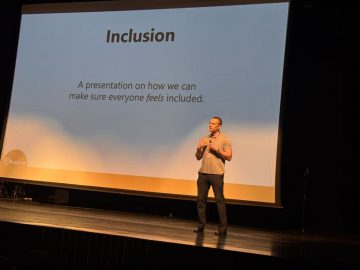
On March 12-14, 2025, Russell Lehmann who is a poet, speaker, and disability advocate, came to AISG as a motivational speaker for elementary students, secondary students, and faculty. As an individual who struggles with Autism, Russell strives to bring visibility to invisible disabilities.
Invisible disabilities include mental health disorders, chronic pain, autoimmune diseases, and other conditions that are not visible to the naked eye. They have the ability to significantly influence one’s daily life, and often go unnoticed and uncared for.
When asked about challenges faced in early childhood, Russel shared that “Not being able to leave the house was definitely a huge impediment to living the life I desired at that point. It impacted me then by really feeling just bad about myself, not being able to function, really beating myself up. The outside world wasn’t too kind to me when I tried to go out. A lot of people didn’t know why I was so anxious when there was nothing anxious to be about. It really gave me a lot of self-doubt and insecurity, it made me want to withdraw from the world more.”
Russel found it hard to trust the outside world, as he felt that he wasn’t receiving adequate help. Unpleasant experiences with the greater environment really affected his self-esteem, and made him feel like an inconvenience to others, like he was too emotional. Russel explained, “They said I wasn’t doing life right, whatever that meant”.
Neurodiversity awareness seeks to recognize the diversity of different brains and establishes a “Neurotypical” population. This group expresses themselves in ways that are seen as the societal “norm”. However, all brain functioning is unique; we are all diverse, and the boundaries that define a neurotypical person are becoming less and less distinct.
The Coordinator of Indifference to Difference GCED, 12th grade Eric said “I first learned about Mr. Russell Lehmann during a lesson on neurodiversity that we organized for Indifferent to Difference, which left a strong impression on me. Moreover, the ideas he shared, such as the concept of ‘inclusivity pretense,’ deeply resonated with me. It made me reflect on whether my efforts in ItoD were truly for the autism community or merely a way to enhance my college application.”
Russell outlines how he initially welcomed his diagnosis, but not receiving adequate support while being part of a marginalized community frustrates him. Insincere help, which benefits no one but one’s ego and potential application, could be the root cause of the overall lack of support. Russel said, “There’s all this awareness, in my opinion, a lot of superficial acceptance. But when the rubber hits the road, there’s not a lot of follow-through in those actions. To this day, when I reach out my hand for help, oftentimes I don’t get it.”
Patricia Inayaty, an elementary teacher expressed her commitment to becoming more considerate towards her students, some of whom struggle with disabilities such as ADHD. She shared that “It’s important to ask questions and understand the reasons behind their behaviors. At the same time, I recognize the importance of being kind to ourselves. From a teacher’s perspective, we must also acknowledge that we carry a lot of responsibilities. Managing the academic and social-emotional needs of 20 or more students, alongside our own struggles, is no easy task.”
Russel indicated how crucial education systems are for raising awareness and inclusion among all students. He said “educational systems are so powerful because, you know, they tend to educate people who are still developing and not full adults yet. In those formidable years when you’re still developing as a child, it’s a requirement to interact with your environment.
“There are very few people in this world who don’t grow up being educated in a formal setting, and unfortunately, a lot of formal educational settings are one size fits all, you know, and that is just not how the world works out it’s not one size does not fit. People, everybody is different, not to people are like, and unfortunately, I think a lot of our educational systems do a lot more harming good.”
Shannie, a 10th grade student shared how she was inspired while listening to Russell’s speech. She said, “I was moved while listening to Russell Lehmann’s speech. His insights on resilience made me rethink how important inclusivity is for everyone. Russell’s message can encourage people to be more supportive and accepting in our community.”
Fortunately, despite however slowly, humanity seems to be moving in the right direction. Russell explained that he continues to have faith in the progression of his work life and that he will someday be able to open up on such a level to people in his personal circle. He said, “I’m starting from the ground up, so I’ve gotta be patient with myself. give myself time and realize I’m just getting started even though I’m 34 I’m just getting started, and that’s of a beautiful thing, right?”
“It’s tough personally right now, but it is slowly, very slowly getting better and to look at how far I’ve come 20 years since my diagnosis. In 10 years, I feel like I’m gonna be on the top of the world.”
Concealing public displays of emotion is a social norm for everyone. Russel outlines that “Everybody’s an emotional person and the fact that we must pretend we’re not usually here with our emotions. And I think, you know, it’s a beautiful thing when we can come together through a tough phase. We all are going through pain, but you know, we all have to fake it, like we’re not in pain and we waste that opportunity to come together.”
To conclude, Russell emphasizes enjoying life, through all the ups and downs that may come. When asked what advice he would give to himself 10 years prior, he said, “Russell don’t worry, don’t worry. Enjoy the ride. It’s gonna be a beautiful journey. What is laughter with that crying? This too shall pass.”